
|
Getting your Trinity Audio player ready...
|
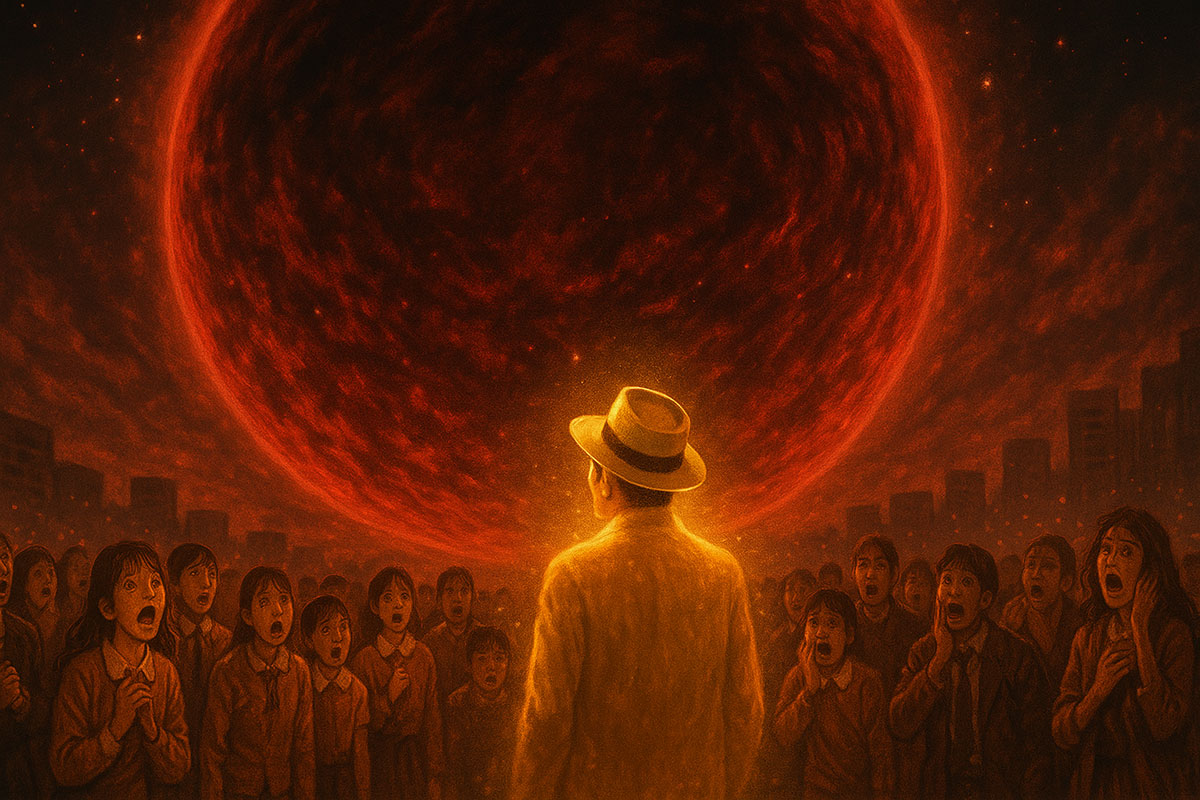
The other day, one of my disciples came to me and said, ‘Hitori-san, if a giant red planet appeared in the sky, devouring stars and heading straight for Earth, what would you do?’
I laughed and said, ‘First of all, I’d say, “Welcome! But please, take a number and wait your turn.” You see, people always panic when something big shows up in life—whether it’s a planet, a problem, or a tax bill. But here’s the trick: big things only look scary because you forget how small they really are next to gratitude. Even the largest planet in the sky can’t swallow a single smile. A smile is too slippery—it always escapes!’
So if I saw Hellstar Remina hanging over us, I wouldn’t scream. I’d bow politely, say, ‘Thank you for reminding me to live fully today,’ and then I’d go grab some tea and dango. After all, if the universe is ending, you might as well enjoy dessert.
(Note: This is an imaginary conversation, a creative exploration of an idea, and not a real speech or event)

Scene 1: The Planet Appears

It began with wonder, not fear. A new planet had appeared in the sky. Astronomers announced it excitedly, reporters wrote glowing headlines, and the people of Earth gazed upward in awe. The celestial body, a brilliant sphere glowing faintly with crimson light, drifted into the heavens like a jewel.
And what made the discovery stranger still—it had been found by a famous scientist, and he had named it after his daughter. Remina.
The girl herself, shy and soft-spoken, was suddenly thrust into the spotlight. Crowds gathered to praise her, magazines printed her face alongside the glowing orb, and people whispered that her beauty was as mysterious as the planet bearing her name. Some even began worshipping her, convinced she carried cosmic significance.
But as weeks passed, awe turned to dread. The planet drew closer—too quickly, far too quickly. Its path cut straight toward Earth, and along the way, other stars, other worlds, began to vanish. Entire constellations disappeared, swallowed whole by the crimson sphere. The jewel was not beautiful. It was hungry.
Fear spread like wildfire. The same people who had adored Remina now hissed her name with suspicion. “She brought it,” they muttered. “She’s cursed. She’s the reason.” Praise turned to scorn, worship to hatred.
Crowds gathered in the city square, torches raised, banners torn, chanting in anger. The girl trembled, clutching her father’s arm, as the mob pressed closer. “It’s her fault! Punish the girl!”
And then, breaking through the roar of fear, came a sound no one expected—laughter. Warm, cheerful, almost musical, like a breeze in the middle of a storm. The crowd turned to see a man in a white hat walking calmly through the chaos, hands in his pockets, smiling as if he had stumbled into a street festival. It was Hitori-san.
“Oh-ho!” he exclaimed, tilting his hat to the mob. “What a party! But you’ve forgotten the most important thing—snacks. A mob without rice balls is just bad planning. All this shouting and not even one tray of dango?”
The crowd blinked, caught off guard. Some lowered their torches in confusion. Even Remina herself stared at the strange man in astonishment.
Hitori-san walked to the girl’s side, bowing slightly. “And you must be Remina-chan. My, my! A planet gets named after you and suddenly everyone thinks you’re responsible for intergalactic weather. That’s like blaming a baby named ‘Sunny’ for tomorrow’s rain!”
The mob erupted in nervous laughter. The absurdity of his words poked holes in their rage.
One man shouted, “But the planet—it’s eating stars! It’s coming for us! And her name is tied to it!”
Hitori-san nodded thoughtfully, then grinned. “Yes, yes, it’s scary. But tell me, does the planet come with a receipt saying, ‘Property of Remina-chan’? No? Then it’s just coincidence. Poor girl gets blamed because her dad thought she had a pretty name. If the planet was named after me, you’d all be shouting, ‘It’s Hitori-san’s fault! Punish him!’ And then I’d say, ‘Sorry, I’m busy laughing—come back later.’”
The mob cracked again, laughter spreading wider this time. The torches lowered further. The anger softened into confusion, even embarrassment.
Hitori-san turned to Remina, his voice gentle. “Listen, young lady. You’re not cursed. You’re not guilty. You’re just you. Don’t let the world’s fear crawl into your heart. Fear loves to borrow your name, but gratitude writes your true story.”
Remina’s eyes welled with tears, but for the first time, she smiled faintly.
The crimson planet still loomed above, massive and menacing, but for a moment the crowd no longer saw a curse in the girl before them. They saw a child—frightened, innocent, undeserving of their blame.
And all because one man laughed at the sky, bowed to the impossible, and reminded them that even under a hungry planet, gratitude could still shine brighter than fear.
Scene 2: The Planet Draws Closer
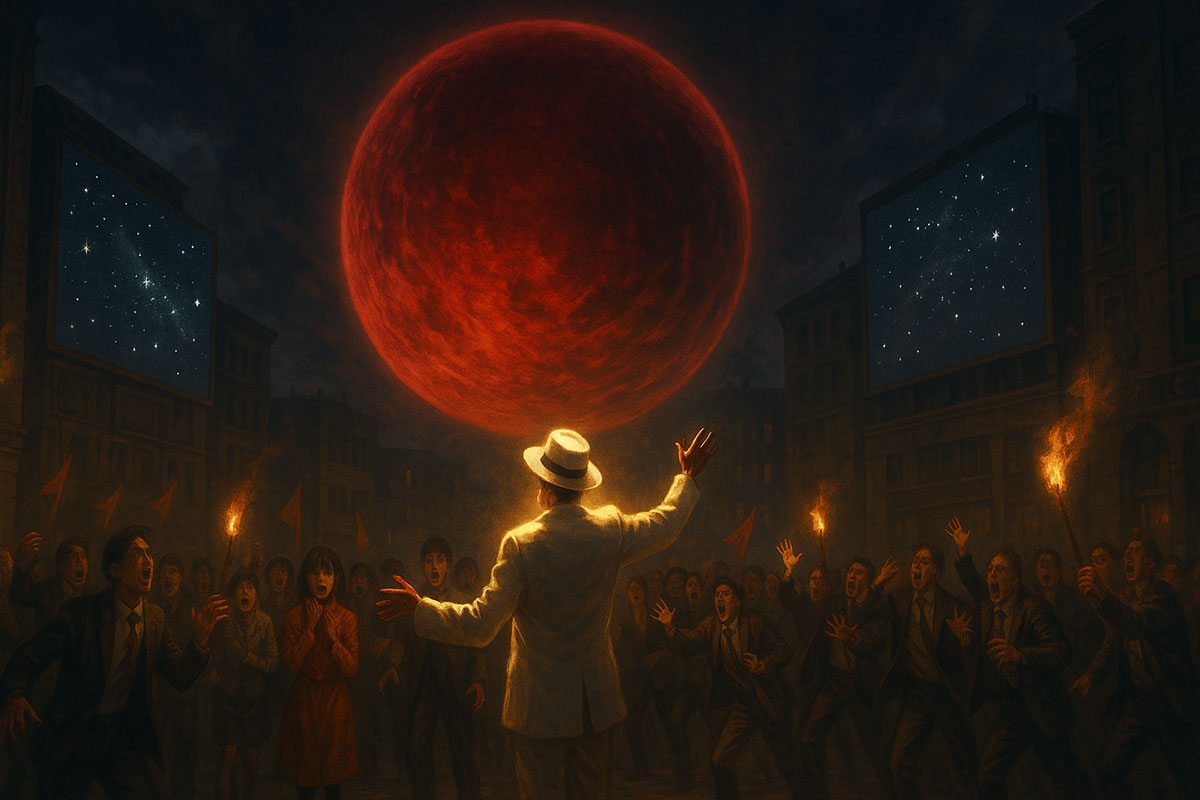
The world could no longer pretend it was safe. The crimson planet loomed larger each night, its glow staining the sky like spilled wine across velvet. Telescopes confirmed the unthinkable: stars, entire systems, even massive suns were being consumed. Wherever Remina drifted, destruction followed.
Scientists issued reports, their voices trembling. Governments panicked. Religious cults sprouted like weeds, some declaring the end of days, others proclaiming Remina—the girl—as the key to salvation or ruin. Streets filled with chanting, protests, and despair.
Everywhere, people looked upward and whispered, “It’s coming for us.”
In one crowded city square, giant screens displayed live footage of the cosmic approach. Galaxies winked out one by one as if swallowed by an invisible throat. The crowd wailed, clutching each other, praying, cursing, screaming. “We’re next!” someone cried. “Earth will be devoured!”
The noise was unbearable. Panic thickened the air like smoke. Children sobbed, mothers wept, and grown men shook like leaves. It felt as though the whole world was already lost.
And then, as if the universe wanted to remind them that joy was not extinct, a new sound cut through the hysteria—laughter. Bright, warm, and playful, echoing like bells in the chaos. Heads turned, eyes wide.
There he was. Hitori-san, walking calmly through the terrified crowd in his white hat, smiling as though he were taking a stroll in the park. He looked up at the enormous red planet, whistled, and clapped his hands.
“Well, would you look at that! Free fireworks! You don’t even have to buy tickets. And it’s not just any firework—it’s the galaxy-sized deluxe version. Don’t be afraid, everyone. At least the universe is giving us a front-row seat!”
The crowd blinked, stunned. Some gasped at his levity, but others chuckled nervously. The sheer absurdity of treating cosmic annihilation like a festival was disarming.
A man shouted angrily, “How can you laugh? That thing is eating everything! We’re doomed!”
Hitori-san tipped his hat, still smiling. “Doomed? My friend, we’ve been ‘doomed’ since the day we were born. Nobody gets out of life alive. But listen—doom is just a word fear likes to use. Gratitude has another word for it: ‘today.’ We’re still here today. Breathing, laughing, eating. That planet hasn’t eaten us yet. So let’s give thanks before dinner is served!”
The words rippled through the crowd. Some shook their heads, muttering he was insane. But others smiled weakly, then laughed outright. A mother hugged her child tighter, whispering, “He’s right. We’re alive today.”
Hitori-san continued, his tone light but steady. “You see, everyone is busy staring at the red planet, but you’re forgetting something important. The stars around it are disappearing, yes. But look up! There are still billions more shining tonight. Fear makes you blind to the light. Gratitude reminds you the sky is still full.”
Children craned their necks, pointing out stars their parents hadn’t noticed in weeks. For a moment, the crowd breathed easier.
One man muttered, “But if it swallows Earth too… isn’t everything meaningless?”
Hitori-san laughed gently, wagging his finger. “Meaningless? Oh no, my friend. If life were meaningless, you wouldn’t laugh at my silly jokes. Laughter is proof that life is already full. Gratitude makes even the smallest moment brighter than galaxies. Stars may vanish, but a smile is eternal.”
The crowd burst into laughter—genuine this time. Not loud enough to drown out fear completely, but enough to pierce it. The crimson planet still loomed, but the square was no longer filled with only terror. It was filled with the strange, stubborn sound of joy.
Remina herself, standing with her father at the edge of the crowd, stared at Hitori-san with wide eyes. For days she had felt nothing but guilt, certain the world saw her as a curse. But here was a man who treated even the planet of death like a silly guest at a festival. For the first time, she felt a spark of hope.
And above them, the red sphere drifted closer, vast and unstoppable. Yet somehow, under Hitori-san’s laughter, it seemed just a little less hungry.
Scene 3: The Mob Turns on Remina
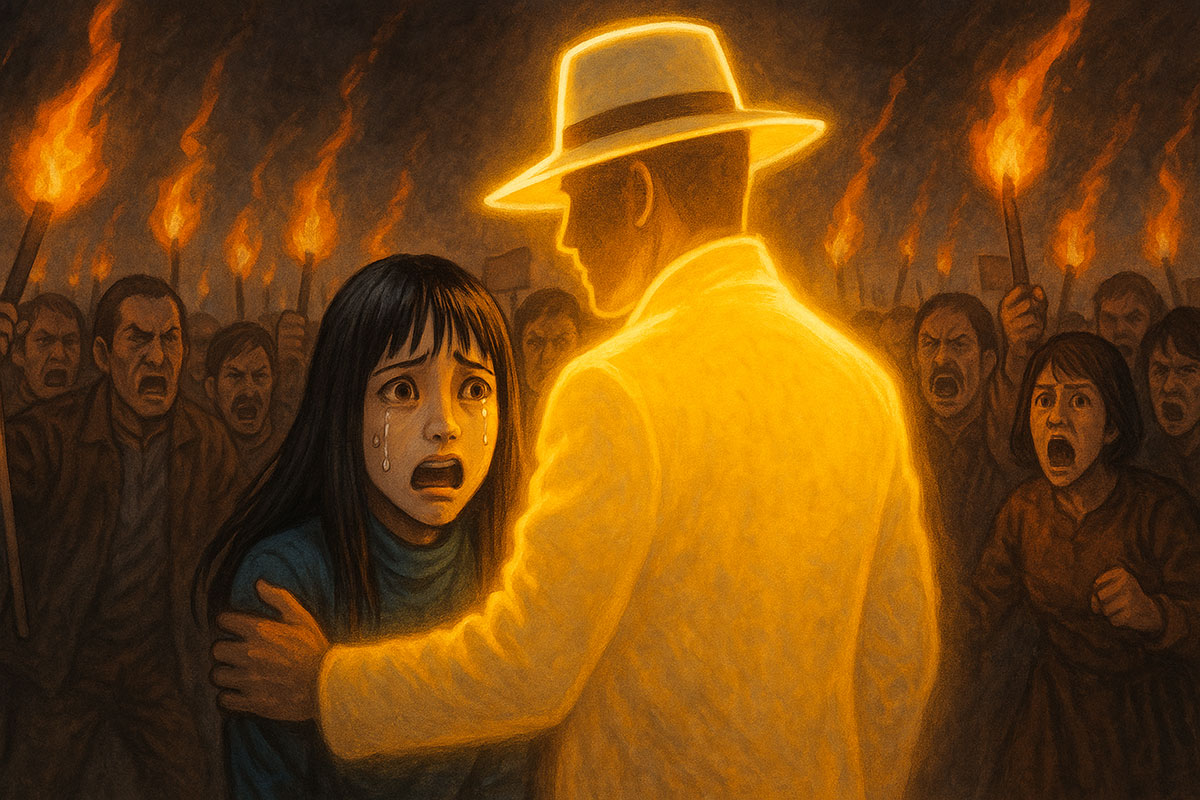
As the red planet loomed larger each night, fear turned to desperation. Entire nations rioted. Food vanished from markets, cities crumbled into chaos, and cults marched in the streets chanting prophecies of doom. But in one corner of Japan, all of that terror focused on a single person: Remina, the young girl after whom the planet had been named.
At first she had been celebrated, adored, even worshipped. But now, as the crimson sphere devoured stars and loomed ever closer, people spat her name like poison. “She’s cursed!” they cried. “Her very existence brought this on us!”
One night, a mob surged through the streets. Hundreds carried torches and weapons—sticks, chains, knives, anything they could find. Their eyes burned with rage. Their voices roared in unison:
“Find her! Deliver us from the curse! If she dies, the planet will stop!”
Remina trembled in her father’s arms, tears streaking her face. “Papa… what do I do? They hate me.” Her father clutched her tighter, whispering frantically, “It isn’t your fault. We must run.”
But the mob was too fast. They swarmed the house, smashing windows, tearing down the door. In moments, Remina was dragged into the street, her father pushed aside. The crowd surrounded her, their voices rising like a storm.
“She’s the reason!”
“Throw her to the planet!”
“Sacrifice her and we’ll be saved!”
Remina sobbed, shielding her face. The crowd raised their weapons—until suddenly, laughter rang out. Not cruel laughter, not the laughter of madness, but warm and cheerful, like bells breaking through thunder.
“Ahh, what’s this?” Hitori-san strolled calmly into the circle, hands in his pockets, his white hat tilted low. His glow cut through the firelight like dawn against night. “You’ve gathered so many people, carrying torches, shouting together—what a lively festival! But forgive me, where are the takoyaki stands? Where are the cotton candy stalls? If this is a festival, you’re doing it all wrong!”
The mob faltered, blinking at him in confusion. Some lowered their weapons. A few even chuckled nervously.
Hitori-san continued, grinning. “And poor Remina-chan! Just yesterday you were treating her like an idol, and today you’re treating her like trash. Make up your minds! If planets disappeared every time we blamed the wrong person, the universe would be empty by now.”
A man snarled, “You don’t understand! Her name is cursed. The planet bears her name. She’s tied to it!”
Hitori-san wagged his finger playfully. “Tied to it? My friend, if naming something connected you to it, then every baby named Sakura would be responsible for cherry blossom season. If you name your son ‘Sho,’ is he tied to every shoe in the world? Ridiculous! The only curse here is fear—and you’re feeding it with both hands.”
The mob murmured, uncertain. Torches wavered.
Hitori-san stepped closer to Remina, shielding her with his presence. “Listen, everyone. Fear loves to find a scapegoat. It whispers, ‘Blame her, and you’ll be free.’ But gratitude whispers something stronger: ‘Thank her, and you’ll learn.’ You should be thanking Remina-chan! Because through her, you’ve seen the truth—fear doesn’t save you. Only courage, kindness, and laughter can.”
His words rippled through the crowd. Some shook their heads in shame. Others chuckled despite themselves.
Then, turning to Remina, Hitori-san lowered his voice. “Young lady, don’t let their words crawl into your heart. You are not the planet. You are not a curse. You are a child with a beautiful name, and that name is yours—not the sky’s.”
Remina’s tears slowed. She looked up at him, eyes wide, and whispered, “Thank you.”
The mob hesitated. Their anger cracked, replaced by confusion. And then, unbelievably, one man laughed. “He’s right. We sound like fools.” Another followed. Soon the laughter spread, awkward but genuine, until even the torches seemed to burn less brightly.
The red planet still glared from above, massive and hungry. But in that moment, the people below remembered they were human—not beasts, not mobs, just people, capable of laughter even under cosmic doom.
And it was all because one man, smiling beneath his hat, dared to call the end of the world a festival missing its snacks.
Scene 4: The Planet Devours the Sky
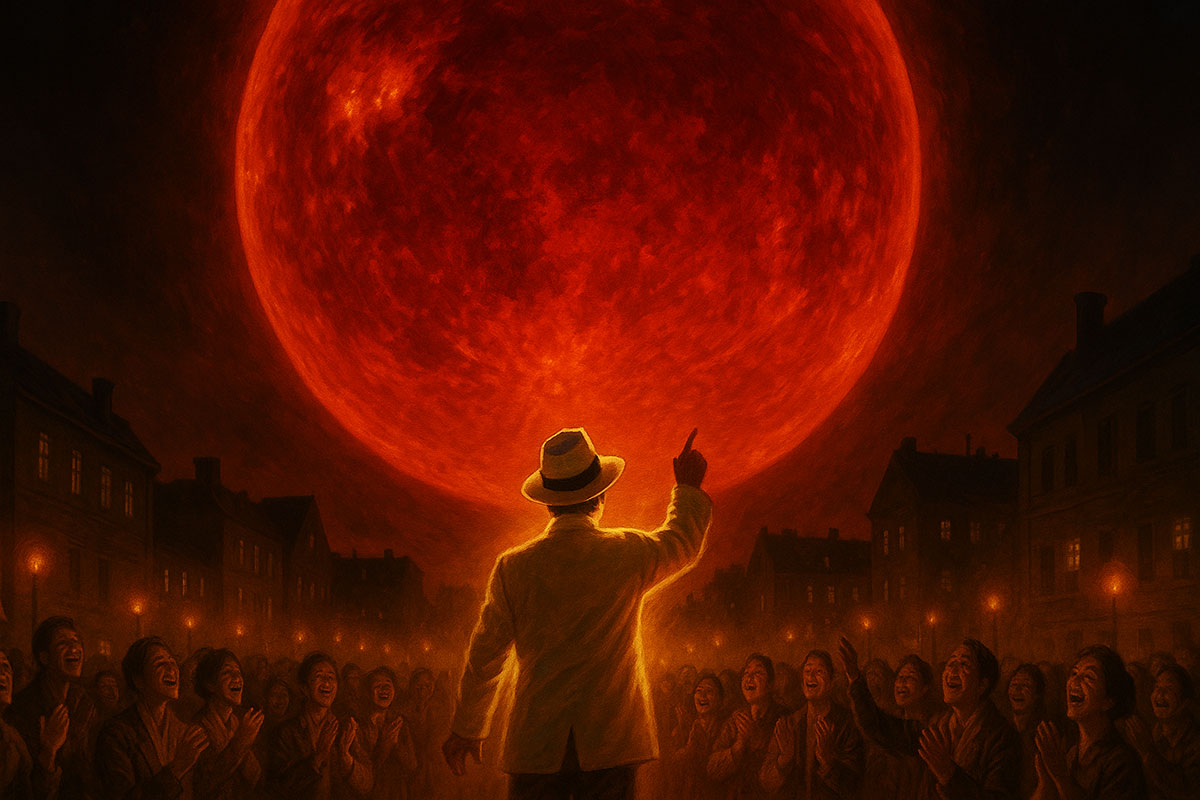
The red planet filled the heavens now. It was no longer a distant sphere but a monstrous eye staring down upon Earth. Its surface writhed with storms, vast crimson whirlpools swirling across an alien landscape. Every night it grew larger, blotting out stars, erasing constellations that had shone for millennia.
The world watched in horror as entire galaxies vanished. Astronomers wept. News anchors stammered as live feeds showed constellations flickering out like candles in a storm. Religious leaders declared it judgment day. Soldiers prayed in their tanks, missiles aimed at the sky with no hope of reaching such an impossible foe.
And the people—ordinary men, women, and children—stood frozen under the crimson glow, feeling smaller than ants beneath the sole of a god.
In a city square, thousands gathered, faces pale, eyes wide. They stared at the sky where the moon should have been but now saw only the burning planet of Remina. It was close enough that the air itself seemed to tremble, as though the world was being pulled toward it.
A woman collapsed, screaming, “It’s the end! We can’t escape!” Others clutched each other, sobbing, praying, cursing. Children wailed, their cries blending into the drone of despair.
And then, cutting through the hopeless din, came that familiar sound—laughter. Warm, steady, irrepressible.
The crowd turned, startled, to see a man in a white hat standing calmly in the center of the square. His glow pushed back the crimson light, as though the universe itself made space for his presence. It was Hitori-san.
He tilted his hat, smiled up at the monstrous planet, and said cheerfully, “Well, now! Look at that sky! Free light show, no ticket needed. The whole world gets front-row seats. The stars disappearing? Don’t worry—they’re not gone, they’ve just gone backstage to prepare the encore!”
The crowd blinked. A few people chuckled nervously, and some children giggled, their fear briefly interrupted.
A man shouted angrily, “How can you laugh? Don’t you see? That thing is eating the universe! We’re next!”
Hitori-san nodded solemnly, then grinned. “Yes, yes, it’s scary. But tell me—if the whole universe were gone tomorrow, wouldn’t it be a waste to spend today crying? Better to laugh now, eat something delicious, and thank the sky for giving you one last sunset. Fear steals today. Gratitude fills it.”
The words spread through the crowd like ripples in water. Some wept harder, but others smiled faintly, realizing the truth in his absurd wisdom.
He raised his hand and pointed to the red planet. “That thing up there? Everyone’s calling it a monster. But really, it’s just a reminder. A reminder that everything ends. Stars, planets, even whole galaxies. But what doesn’t end? The smile you gave your neighbor. The kindness you showed your child. The laughter that warmed someone’s heart. That’s eternal.”
Silence fell, heavy and profound.
Then a boy tugged on his mother’s sleeve. “Mama… if the planet eats us, will our laughter still shine?” The mother broke into tears, hugging him tightly.
Hitori-san crouched beside them, his glow soft and warm. “Yes, young man. Laughter echoes longer than stars. When you laugh with love, it travels forever. Even if the universe closes its eyes, your joy will still dance in the dark.”
The crowd trembled. Some cried openly, others laughed through their tears. For the first time, they looked at the crimson planet not only with fear but with a strange, stubborn defiance.
Above them, the red sphere swirled closer, storms churning across its surface like hungry mouths. But in the square below, people began to clap. Slowly, uncertainly at first, then louder. Applause, as if cheering not the planet but their own courage.
Hitori-san tipped his hat, smiling. “There now! If the universe insists on devouring us, let’s at least give it something tasty—our joy. A meal spiced with laughter. Gratitude is the one flavor even a planet can’t swallow.”
The people roared with laughter and applause. And for a moment, even under the shadow of cosmic annihilation, Earth felt lighter.
Scene 5: Laughter at the End of the World
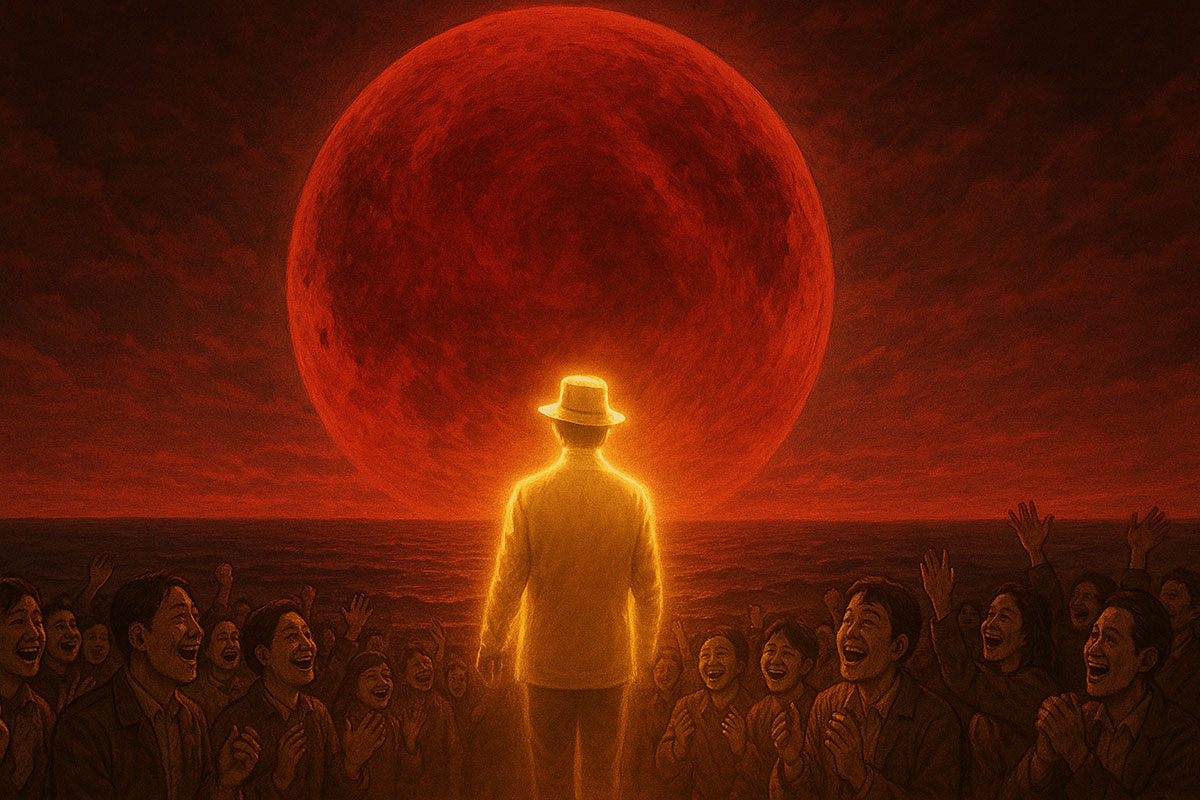
The red planet filled the sky. It was no longer a distant sphere but a monstrous canopy stretching from horizon to horizon. Its surface churned with storms that seemed to stare down at Earth, vast crimson whirlpools opening and closing like hungry mouths. The air grew heavy, the oceans rose in restless tides, and the earth itself shuddered under its gravity.
People huddled together in the streets. Some prayed, others wailed, others simply sat in silence, waiting for the inevitable. The media had gone dark. Governments had collapsed. All that remained was the terrible truth: the planet was close enough now that there was nowhere left to run.
Remina herself sat on the steps of a ruined building, her small body trembling. She buried her face in her hands, whispering, “It’s my fault… everyone hates me… the world is ending because of me…”
But then she heard it—soft at first, then louder. Laughter. Not cruel laughter. Not hysterical laughter. Warm, cheerful, steady, like a candle refusing to go out in the storm. She lifted her head.
There he was. Hitori-san, standing in the middle of the street, his white hat shading his face, his body glowing with golden light that even the crimson sky couldn’t dim. He looked up at the monstrous planet and clapped his hands as though greeting an old friend.
“Well, would you look at that!” he said. “The biggest rice ball in the universe, rolling right toward us. And here you are, all frowning like you’ve just been told taxes went up. Don’t you see? We’ve been given front-row seats to the grand finale! Not everyone gets to see the curtain call of the cosmos. We should be grateful for the best seat in the house.”
The crowd stared at him, stunned. Some laughed despite themselves, others shook their heads in disbelief.
A man shouted, “How can you joke now? Don’t you see? It’s over!”
Hitori-san tipped his hat. “Over? No, my friend. Life is never ‘over.’ It just changes its clothes. You may lose the world, but you’ll never lose your smile if you choose to keep it. Gratitude outlives planets. Joy is bigger than galaxies.”
The words struck deep. Mothers clutched their children tighter, whispering comfort. Men who had been weeping wiped their eyes and chuckled. Even Remina, trembling and broken, looked up with wide eyes.
Hitori-san turned to her, his voice gentle. “Remina-chan, listen carefully. You are not a curse. You are not guilty. You are a reminder. Just like this planet, your name has shown the world its fear. But you can also show it joy. Don’t carry the blame of others in your small shoulders. Carry laughter instead—it’s much lighter.”
Tears filled her eyes, but this time they were mixed with a fragile smile.
The planet loomed so close now that the sky was nearly swallowed by red. The ground shook, and the horizon blurred with rising tides. Yet amid the chaos, the people began to laugh—not hysterically, not desperately, but freely, as though they had chosen to live fully even in their final moments.
Hitori-san raised his arms wide. “That’s it! Let the universe hear you. If this is our last day, then let us make it the loudest festival of gratitude the stars have ever seen. Fear wanted silence. Let’s give it laughter instead!”
The crowd erupted. Laughter, applause, cheers—it rose into the crimson sky like a beacon. The air trembled with joy so strong it seemed to push back against the planet’s weight.
And as the red sphere descended, Hitori-san stood at the center, glowing brighter than ever, his face hidden in shadow but his smile radiating in every word:
“Remember, my friends—planets may fall, worlds may end, but gratitude never dies. Laughter echoes forever, even through the dark.”
The crimson sky swallowed everything. But in that final moment, the world was not consumed by silence. It was consumed by joy.
Final Thoughts

Last week someone told me, ‘Hitori-san, aren’t you afraid of the universe being destroyed?’ I said, ‘No, no, no. What’s scarier than the universe ending is living your whole life without laughing once.’
The red planet in Remina’s story devours stars, but the real danger isn’t the planet—it’s fear. Fear devours your joy long before any planet arrives. But gratitude? Gratitude is stronger than gravity. It keeps your heart light, even when the sky is falling.
So remember this, friends: if the world ends tomorrow, don’t waste today in terror. Laugh, smile, and give thanks. A single ‘thank you’ shines brighter than galaxies. And if the universe insists on swallowing us, let it eat us while we’re still laughing. That way, joy becomes the last sound the cosmos ever hears.
Short Bios:
Hitori Saito
A Japanese entrepreneur, bestselling author, and beloved teacher of gratitude and laughter. In this reimagining, Hitori-san faces the cosmic dread of Hellstar Remina with humor and light, showing that even a planet devouring galaxies cannot swallow joy.
Junji Ito
One of the most celebrated horror manga artists in the world, Junji Ito created Hellstar Remina, a chilling tale of cosmic annihilation and human hysteria. His genius lies in blending the vast terror of the universe with the small, fragile fears of human hearts.
Remina (the Girl)
The daughter of the scientist who discovered the red planet. Her father named the celestial body after her, unintentionally tying her identity to its destruction. Once adored and worshipped, she is soon scapegoated, hunted, and blamed for the planet’s hunger.
The Red Planet (Hellstar Remina)
A cosmic body drifting toward Earth, consuming entire galaxies in its path. Its appearance brings both wonder and despair. More than just a planet, it represents humanity’s greatest fear: that the universe itself is indifferent and unstoppable.
The Mob
Ordinary people transformed by fear into rage. Once worshippers of Remina, they quickly turn into accusers, blaming her for the planet’s advance. In Hitori-san’s eyes, they are a reminder of how easily fear devours compassion when gratitude is forgotten.

Leave a Reply